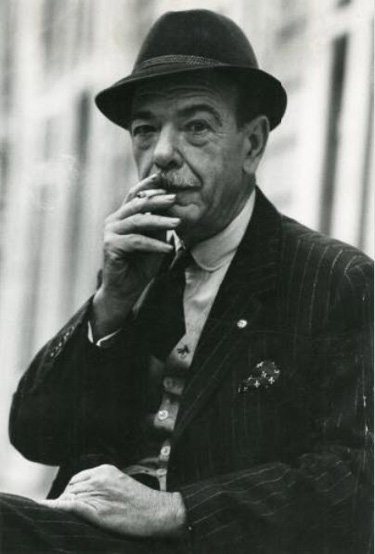Category Archive 'Esquire'
10 Sep 2022

Esquire’s Neil McRobert rates 75 (count ’em!) Stephen King titles.
I did not largely agree with him but, God knows, I haven’t read all 75 of them.
22 Oct 2019


Arnold Gingrich, once upon a time the editor of Esquire.
Long ago, Esquire used to publish articles celebrating masculinity and male interests, including contributors like Ernest Hemingway. The quality of those 1930s and ’40s issues was such that people now collect them.
Today, Esquire is an excruciatingly irritating voice of metrosexual soyboy hysteria endlessly denouncing Trump and grovelling apologetically on behalf of all mankind before the idols of politically correct wokeness.
Brian Patrick Eha notes that the same thing is happening today across the entire men’s lifestyle magazine genre and subscriptions are everywhere precipitously declining.
When the culture changes,†Esquire contributing editor Wesley Yang wrote earlier this year, “each of us must either seek an accommodation or choose a hill to die on.†He was reviewing Bret Easton Ellis’s White, a collection of jeremiads, many aimed, like poison darts, at millennials, the cohort Ellis has dubbed “Generation Wuss.†The voice of an earlier generation, Ellis, who is gay, finds himself shocked by—and contemptuous of—the weak-mindedness and quickness to take offense typical of some millennials. …
In June, Hearst promoted Esquire.com editor Michael Sebastian to replace Fielden as editor-in-chief. As with Pels at Cosmopolitan, the idea is to bring a digital sensibility to the print product—while making digital the top priority. Esquire, a source told WWD, will be getting “a full Cosmo.†I take this to mean that the trends identified in this essay will only accelerate, and that the commitment to social-justice ideology will only harden; that Esquire will soon descend into the sucking morass of what Yang aptly calls “woke clickbait.†No doubt the magazine will struggle on for a time, like a punctured blimp leaking helium, deflating while still aloft, but if it grows in prominence—if the metrics that men like Troy Young care about improve for a time—it will be only as a wounded airship, once high up in the atmosphere, grows larger in the eye as it sinks slowly groundward.
Just as one can’t reinflate a leaky blimp, there is little reason to believe that Esquire’s editorial quality will improve under Sebastian, however much he juices web traffic. The great men’s magazines may eke out a lucrative afterlife hawking clothes and branding nightclubs in India; but as magazines, they are dying or dead—and the dead do not improve.
RTWT
19 Jan 2019


James Salter was a fighter pilot during the Korean War.
Arnold Gingrich, Esquire’s great editor, is spinning in his grave. Former contributors, like Papa Hemingway, doubtless remark ironically in Hell about what has become of the former men’s magazine, today, in the hands of hipster millennial metrosexuals, full of left-wing piety and political correctness.
Today’s Esquire makes a somewhat desperate effort to rustle up subscribers (who wants to read PC sermons and lectures on Diversity?) by recycling quality writing that appeared in the magazine back in the good old days.
The latest revival item is a gem, a 1992 memoir of West Point by James Salter.
My father, hair parted in the middle, confident and proud, was first in his class. A brilliant unknown with a talent for mathematics and a prodigious memory, he graduated just ahead of a rival whose own father was first in 1886.
The school was West Point and he had also been first captain, though that was harder for me to imagine. In any case, the glory had slipped away by the time I was a boy. He had resigned his commission after only a few years and not much evidence of those days remained. There were a pair of riding boots, some yearbooks, and in a scabbard in the closet, an officer’s saber with his name and rank engraved on the blade.
Once a year on the dresser in the morning there was a beautiful medal on a ribbon of black, gray, and gold. It was a name tag from the alumni dinner at the Waldorf the night before. He liked going to them; they were held toward the end of the winter and he was a persona there, more or less admired, though as it turned out there was a flaw in his makeup not visible at the time that brought him, like Raleigh, to the block. It was not his head he lost but his kidneys, from high blood pressure, the result of mortal anguish, of having failed at life.
When I was older he took me to football games, which we left during the fourth quarter. Army was a weak but gritty team that came to Yankee Stadium to play Notre Dame. Behind us, the stands were a mass of gray, hoarse from cheering, and a roar went up as a third-string halfback, thin-legged and quick, somehow got through the line and ran a delirious, slanting eighty yards or so until he was at last pulled down. If he had scored, Army would have won.
In the end I went to the same school my father did, though I never intended to. He had arranged a second alternate’s appointment and asked me as a favor to study for the entrance exam. I had already been accepted at Stanford and was dreaming of life on the coast, working for the summer on a farm in Connecticut and sleeping on a bare mattress in the stifling attic, when suddenly a telegram came. Improbably both the principal and first alternate had failed, one the physical and the other the written, and I was notified that I had been admitted. Seventeen, vain, and spoiled by poems, I prepared to enter a remote West Point. I would succeed there, it was hoped, as my father had.
In mid-July up the steep road from the station we walked as a group. I knew no one. Like the others I carried a small suitcase in which would be put clothes I would not see again for years. We passed large, silent buildings and crossed a road beneath some trees. A few minutes later, having signed a consent paper, we stood in the hall in a harried line trying to memorize a sentence to be used in reporting to the cadet first sergeant. It had to be spoken loudly and exactly. Failure meant going out and getting in line to do it again. There was constant shouting and beyond the door of the barracks an ominous noise, alive, that flared when the door was opened like the roar of a furnace. It was the din of the Area, upperclassmen, some bellowing, some whispering, some hissing like snakes. They were giving the same commands over and over as they stalked the nervous ranks that stood stiffly at attention, still in civilian clothes, already forbidden to look anywhere but straight ahead. The air was rabid. The heat poured down.
I had come to a place like Joyce’s Clongowes Wood College, which had caused such a long shiver of fear to flow over him. There were the same dark entrances, the Gothic facades, the rounded bastion corners with crenellated tops, the prisonlike windows. In front was a great expanse, which was the parade ground, the Plain.
It was the hard school, the forge. To enter you passed, that first day, into an inferno. Demands, many of them incomprehensible, rained down. Always at rigid attention, hair freshly cropped, chin withdrawn and trembling, barked at by unseen voices, we stood or ran like insects from one place to another, two or three times to the Cadet Store returning with piles of clothing and equipment. Some had the courage to quit immediately, others slowly failed. Someone’s roommate, on the third trip to the store, hadn’t come back but had simply gone on and out the gate a mile away. That afternoon we were formed up in new uniforms and marched to Trophy Point to be sworn in.
RTWT
13 Mar 2008
Spook86 has some interesting observation, including a speculation that Admiral Fallon may have provoked China’s denial of port access at Hong Kong to the US Navy last Thanksgiving.
My own impression has been that Esquire’s Barnett took advantage of the Admiral’s indiscretions to produce a hit piece on Bush Administration policy using Admiral Fallon as an involuntary cat’s paw. It is heartening, of course, to see the Bush Administration actually firing someone for undermining its foreign policy. Is it possible, do you suppose, that this novel approach to personnel management may yet extend into the Departments of State and Justice and the Intelligence Community before George W. Bush leaves office?
/div>

Feeds
|

